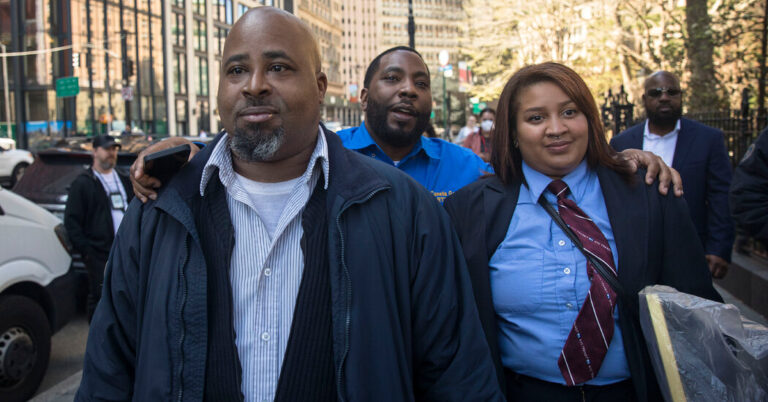Opinion | A Special Anguish Among Palestinian Citizens of Israel
As the rest of the world watches the Gaza war with horror, one community is following it with a particular kind of anguish: the Palestinian citizens of Israel.
They are connected by family ties, language, culture and history to their fellow Palestinians in Gaza — while living, working and studying side-by-side with Jewish Israelis in the very country that caused their people’s misfortune.
Palestinian citizens of Israel are no strangers to seeing their country of citizenship bring force to bear on Palestinians in Gaza and the West Bank, and their own history is rife with systematic discrimination and little recognition of their collective identity. Israel’s war in response to the devastating attack by Hamas on Oct. 7 has led the Israeli government to ratchet up those social, economic and legal pressures, putting an already vulnerable people in an especially thorny place and threatening the fragile links between Jewish and Palestinian citizens.
That is a terrible mistake.
Most of Israel’s two million Palestinian citizens, who make up about 20 percent of the national population, hold on to their Palestinian identity, language and culture. At the same time they speak Hebrew, participate in Israeli politics to varying degrees and are generally acquainted with Jewish and Israeli culture. They hold a unique position, as perhaps the only group that continues to form friendship, partnership and solidarity ties — albeit often flawed and partial — with both the Palestinians across the border and the Jewish citizens of Israel.
That delicate position provides a rare commodity in the region: the ability to see a broader and more nuanced picture and serve as a bridge to a long-lasting solution to the war and the larger conflict. The links between the two groups could be a model for a different future in the area, and a stronger Palestinian voice in Israel could increase the demand for a just and humane resolution to the war, helping both peoples. The Palestinian citizens of Israel are worth listening to.
Many Palestinians in Israel were filled with revulsion on Oct. 7 as Hamas attacked the Israeli towns near the border and murdered and brutalized their inhabitants. They also suffered their own casualties: Seven of the 240 people kidnapped and taken to Gaza were Arab-Palestinian citizens of Israel, and more than a dozen Palestinian citizens were killed in the Hamas attack or by rockets fired from Gaza since that day.
But unlike a majority of Israel’s citizens, who have for the past four months been glued to an Israeli media that barely covers what is happening in Gaza, Palestinian citizens have learned, with dread and panic, from Arab news sources, friends and social media the enormous toll of death and destruction suffered by their people.
Despite the violent history of the Israeli-Palestinian conflict, they’ve been aghast at the deep humanitarian crisis, the starvation of Gazans and the forced displacement of over a million people that evoked the Nakba, or catastrophe — the mass flight and expulsion of Palestinians when Israel became a state.
The trauma has been compounded by their inability to do or even say much about it. The government has cracked down harshly on criticism of its actions, and even empathy with the Palestinian people in Gaza. Palestinian citizens of Israel have borne the brunt of the crackdown.
A Palestinian doctor was suspended from his position, Palestinian students at colleges and universities have been punished, and other people have been arrested for social media posts that were often simply misunderstood by those who don’t speak Arabic.
Well before the war, Palestinian citizens of Israel had to deal with discrimination — lesser government services for education, welfare, housing and culture, along with a campaign against their collective identity. Now the silencing of dissent has had a significant impact not only on the psyches of Palestinian citizens, who worry that even liking a social media post will put them in a cell, but also on their economic well-being.
Since Oct. 7, their unemployment rate has tripled to 15.6 percent largely because of firings for political reasons, boycotts and downturns in sectors with a large proportion of Palestinian Israeli workers. The increase for Jewish Israelis was milder — slightly more than doubling to just over 8.6 percent.
The government is also attempting to cut the very budgets dedicated to the development of Palestinian citizens. The war is estimated to have cost Israel nearly $60 billion in the first three months — an expense so extreme that the Moody’s rating agency recently downgraded Israel’s credit rating.
In an effort to minimize further economic damage, Israel has increased its deficit and is pushing major budget cuts through parliament. These include cuts across the board, but the board isn’t flat. Reductions to funding directed to Palestinian citizens are slated to be three times higher than the rest — 15 percent compared with 5 percent. Through these budget cuts the Palestinians in Israel are effectively paying a disproportionate cost of the war against fellow Palestinians.
This hurts the entire Israeli economy. International institutions such as the O.E.C.D., as well as the Bank of Israel, have warned that without serious investment in the economic development of the large Palestinian community in Israel, the economy could suffer. The plans now threatened to be cut actually work. Over the past few years the employment rate of Palestinian women increased to approximately 45 percent in the second half of 2023 from 33 percent in 2014.
The hostile environment has also worsened the relationship between Jewish and Palestinian citizens, raising fears of a return to the violence in mixed Arab-Jewish cities in Israel of nearly three years ago. Israel’s right-wing government has also begun making it easier for Jewish citizens to acquire weapons.
Rather than isolating and weakening the Palestinian citizens of Israel, marking them as the “enemy within” through repressive tactics, the Israeli government must remove discriminatory policies against them and stop fighting recognition of their Palestinian identity.
Doing so would create a model of what equal partnership between Palestinian and Jewish Israelis could look like, one that would signify a significant step toward reconciliation and an end to the cycle of violence.
Raghad Jaraisy and Ofer Dagan are co-chief executives of Sikkuy-Aufoq, a nonprofit run by Palestinian and Jewish citizens of Israel working to create a more equal and shared society.
The Times is committed to publishing a diversity of letters to the editor. We’d like to hear what you think about this or any of our articles. Here are some tips. And here’s our email: [email protected].
Follow the New York Times Opinion section on Facebook, Instagram, TikTok, X and Threads.
Check out our Latest News and Follow us at Facebook
Original Source






